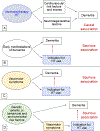Risks and benefits of hormone therapy after menopause for cognitive decline and dementia: A conceptual review
- PMID: 38649310
- PMCID: PMC11095817
- DOI: 10.1016/j.maturitas.2024.108003
Risks and benefits of hormone therapy after menopause for cognitive decline and dementia: A conceptual review
Abstract
Objective: The effects on the brain of hormone therapy after the onset of menopause remain uncertain. The effects may be beneficial, neutral, or harmful. We provide a conceptual review of the evidence.
Methods: We 1) provide a brief history of the evidence, 2) discuss some of the interpretations of the evidence, 3) discuss the importance of age at menopause, type of menopause, and presence of vasomotor symptoms, and 4) provide some clinical recommendations.
Results: The evidence and the beliefs about hormone therapy and dementia have changed over the last 30 years or more. Five recent observation studies suggested that hormone therapy is associated with an increased risk of dementia, and the association appears not to change with the timing of initiation of therapy. These harmful associations may be explained by a causal effect of hormone therapy on the brain or by several confounding mechanisms. We suggest that the use of hormone therapy should be customized for different subgroups of women. It may be important to subgroup women based on age at onset of menopause, type of menopause, and presence or absence of vasomotor symptoms. In addition, the effects may vary by type, dose, route, and duration of administration of estrogens and by the concurrent use of progestogens.
Discussion: The relation of hormone therapy with the risk of dementia is complex. Hormone therapy may have beneficial, neutral, or harmful effects on the brain. Hormone therapy should be guided by the clinical characteristics of the women being treated.
Keywords: Age at menopause; Dementia; Hormone therapy; Type of menopause; Vasomotor symptoms.
Copyright © 2023. Published by Elsevier B.V.
Conflict of interest statement
Declaration of competing interest The authors declare that they have no competing interest.
Figures



Similar articles
-
Cognitive changes after menopause: influence of estrogen.Clin Obstet Gynecol. 2008 Sep;51(3):618-26. doi: 10.1097/GRF.0b013e318180ba10. Clin Obstet Gynecol. 2008. PMID: 18677155 Free PMC article. Review.
-
The route of administration, timing, duration and dose of postmenopausal hormone therapy and cardiovascular outcomes in women: a systematic review.Hum Reprod Update. 2019 Mar 1;25(2):257-271. doi: 10.1093/humupd/dmy039. Hum Reprod Update. 2019. PMID: 30508190
-
Hormone Therapy for the Primary Prevention of Chronic Conditions in Postmenopausal Women: US Preventive Services Task Force Recommendation Statement.JAMA. 2017 Dec 12;318(22):2224-2233. doi: 10.1001/jama.2017.18261. JAMA. 2017. PMID: 29234814
-
Management of postmenopausal women: Collège National des Gynécologues et Obstétriciens Français (CNGOF) and Groupe d'Etude sur la Ménopause et le Vieillissement (GEMVi) Clinical Practice Guidelines.Maturitas. 2022 Sep;163:62-81. doi: 10.1016/j.maturitas.2022.05.008. Epub 2022 Jun 9. Maturitas. 2022. PMID: 35717745 Review.
-
Oophorectomy, estrogen, and dementia: a 2014 update.Mol Cell Endocrinol. 2014 May 25;389(1-2):7-12. doi: 10.1016/j.mce.2014.01.020. Epub 2014 Feb 5. Mol Cell Endocrinol. 2014. PMID: 24508665 Free PMC article. Review.
Cited by
-
Associations of age at menopause, bilateral oophorectomy, hysterectomy and hormone replacement therapy with glycaemia and risk of dementia: a study based on the population-based UK Biobank cohort.BMJ Public Health. 2025 Jul 27;3(2):e002120. doi: 10.1136/bmjph-2024-002120. eCollection 2025. BMJ Public Health. 2025. PMID: 40734962 Free PMC article.
-
Impact of dementia and mild cognitive impairment on bone health in older people.Aging Clin Exp Res. 2024 Dec 27;37(1):5. doi: 10.1007/s40520-024-02871-y. Aging Clin Exp Res. 2024. PMID: 39725855 Free PMC article. Review.
-
Hormone replacement therapy, menopausal age and lifestyle variables are associated with better cognitive performance at follow-up but not cognition over time in older-adult women irrespective of APOE4 carrier status and co-morbidities.Front Dement. 2025 Jan 17;3:1496051. doi: 10.3389/frdem.2024.1496051. eCollection 2024. Front Dement. 2025. PMID: 39897117 Free PMC article.
References
Publication types
MeSH terms
Substances
Grants and funding
LinkOut - more resources
Full Text Sources
Medical

